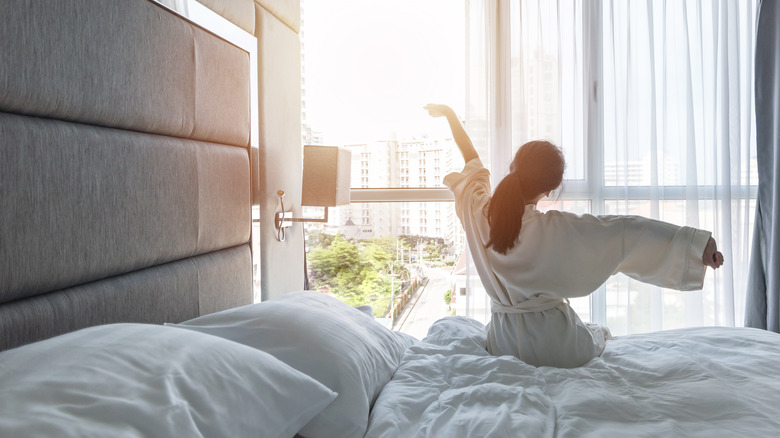What Happens To Your Body When You Start Waking Up Earlier
Waking up earlier to get more done sounds like a great idea, in theory. In reality, most of us are much more tempted to pull the covers back over our heads, hit snooze, and stay asleep as long as possible. But getting up early has some serious health benefits — it just depends on what you're doing with your extra time.
Your brain is the first thing to change once you make the early morning shift. Research has found that early risers tend to be happier and have a sunnier outlook on life, and are generally more proactive and quick to problem solve (via Pocket).
While there aren't many easy health benefits to point to — your blood pressure doesn't immediately become optimized and you won't drop 10 pounds in a week — getting up early does allow time for more healthy habits before the interruptions of the day start to impact your schedule. Early risers tend to have an easier time getting in a workout, eating a healthy breakfast, spending time meditating, or even just enjoying a leisurely chat with their families (via Zen Habits).
You might find that it's easier to eat healthier, too: Studies have found that those who sleep in tend to consume around 248 calories more than the average early riser. They also tended to eat less vegetables and more fast food (via NeuroTracker).
How can you start getting up earlier?
The first few days of getting up early are going to be tough. You may want to start by gradually progressing your alarm clock earlier in 15 minute increments, rather than going from a 7 AM wakeup to a 5 AM alarm in a single night. "It may take a few days of feeling less than optimal when switching to wake earlier in the morning, because it takes time for your internal clock to adjust to the new sleep-wake hours," Kasey Nichols, doctor of naturopathic medicine, told Pocket.
From a practical perspective, Zen Habits has a great tip: Put your alarm outside of your bedroom, or at least far enough away from the bed that you need to get up in order to shut it off. And make a fun morning plan for yourself. Don't force yourself to go for a run if you hate running and instead, choose an activity that you enjoy.
It is important to note, though, that while early rising sounds great in principle, you do need to get adequate sleep in order to actually function at this high level. So make sure that your bedtime is shifting earlier as your alarm clock to wake up shifts earlier. That seven to nine hours of sleep recommended each night still stands, so if you're waking up at 5 AM, you need to be in bed by 10 PM. Even losing a single hour of sleep for a few days in a row can lead to decreases in performance, so any gains you make by getting up earlier will be limited by your sleepiness later (via Johns Hopkins Medicine).


